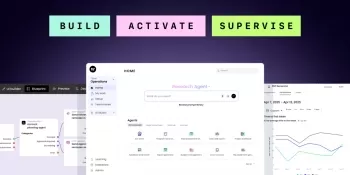Writer Launches 'AI HQ' Platform, Aiming to Revolutionize Enterprise Work with Agents

Today, the enterprise AI company Writer unveiled a groundbreaking platform that they believe will finally close the gap between AI's theoretical capabilities and practical outcomes. Named "AI HQ," this platform marks a significant move towards autonomous AI systems capable of managing complex organizational workflows.
At a press conference, Writer's CEO and co-founder, May Habib, expressed enthusiasm about the launch, stating, "This isn't just another hype train; it's a massive shift in enterprise software." She highlighted the disconnect between the potential of AI technology and the actual results seen in businesses over the past two years. "We've never seen such a gap between what the tech can do and what enterprises are achieving," Habib remarked.
AI HQ is designed to address this issue by offering a platform where businesses can develop, activate, and oversee AI "agents" that handle sequences of tasks typically requiring human intervention. These agents are equipped to make decisions, solve problems, and execute actions across various systems with minimal human supervision.
How Writer's AI Agents Move Beyond Chatbots to Deliver Real Business Value
The launch of AI HQ coincides with a period where many enterprises are rethinking their AI strategies. Habib noted that most AI implementations have not met expectations, with companies struggling to progress beyond basic uses of generative AI.
"Process mapping is the new prompt engineering," Habib stated, indicating a shift from simply creating text prompts to designing complete AI-driven workflows. AI HQ comprises three main elements: Agent Builder, a development environment for collaborative agent creation; Writer Home, offering over 100 pre-built agents tailored to specific industries and functions; and tools for monitoring and governing agent behavior on a large scale.
During a demonstration, Writer's executives showcased how clients are already benefiting from these technologies. For instance, an investment management firm uses Writer's agents to automatically generate fund reports and personalized market commentary, pulling data from Snowflake, SEC filings, and real-time web searches.
Another example involved a marketing workflow where an agent could analyze a strategy brief, set up a project in Adobe Workfront, create content, source or generate supporting images, and prepare materials for legal review.
Enterprise AI that Actually Works: How Writer's Autonomous Agents Tackle Complex Business Workflows
Writer's shift towards agent-based AI aligns with broader market trends. Initially, companies focused on using large language models for text generation and chat functions, but now they're exploring how AI can automate intricate processes.
In a recent interview with Forbes, Habib suggested a potential workforce impact, stating, "Ten percent of the headcount is going to be enough." This bold claim reflects the transformative potential—and potential disruption—of these technologies in knowledge work.
Anna Griffin, Chief Marketing Officer at cybersecurity firm Commvault and an early adopter of Writer's agent technology, spoke at the press conference about the value of integrating previously disconnected systems. "What if I could connect our Salesforce, Gainsite, Optimizely? What if I could combine insights from these systems to create a seamless experience for our customers?" Griffin shared. She advised others to consider, "Think about the hardest, gnarliest problem your industry faces, and start thinking about how agentic AI can solve it."
The Future of AI Learning: Writer's Self-Evolving Models Remember Mistakes and Learn Without Retraining
The event also featured a presentation from Waseem AlShikh, Writer's co-founder and CTO, who introduced research on "self-evolving models"—AI systems that learn from their errors over time without needing additional training.
"If we want AI to behave more like a human, we need it to learn more like a human," AlShikh explained. He demonstrated how traditional AI models repeatedly make the same mistakes when navigating a maze, while self-evolving models remember past failures and find improved solutions.
"This unique architecture means that as the model is used, it gains knowledge—a model that becomes smarter with more interaction," AlShikh said. Writer anticipates having self-evolving models in pilot by year's end.
Inside Writer's $1.9 Billion Valuation: How Enterprise AI Adoption is Driving Explosive Growth
Writer's ambitious expansion follows a $200 million Series C funding round last November, valuing the company at $1.9 billion. The round was co-led by Premji Invest, Radical Ventures, and ICONIQ Growth, with participation from major enterprise players like Salesforce Ventures, Adobe Ventures, and IBM Ventures.
The company has experienced significant growth, reporting a 160% net retention rate, meaning customers typically increase their contracts by 60% after initial adoption. According to a Forbes report published today, some clients have scaled from initial contracts of $200,000-$300,000 to spending approximately $1 million each.
Writer's approach differs from competitors like OpenAI and Anthropic, who focus on general-purpose AI models. Instead, Writer has developed its own models, named Palmyra, specifically for enterprise use cases.
"We trained our own models even though everyone advised against it," AlShikh told Forbes. This strategy has allowed Writer to create more secure AI for enterprise deployment, as client data is retrieved from dedicated servers and not used for model training, addressing concerns about sensitive information leaks.
Navigating the $114 Billion Enterprise AI Market: Opportunities and Obstacles Ahead
Writer's ambitions face challenges in a competitive landscape. The enterprise AI software market, projected to grow from $58 billion to $114 billion by 2027, attracts fierce competition from tech giants and well-funded startups.
Paul Dyrwal, VP of Generative AI at Marriott, who appeared at Writer's press conference, offered advice for enterprises navigating this rapidly evolving field: "Focus on fewer, higher-value opportunities rather than chasing every possibility."
The announcement also comes amidst growing concerns about AI's impact on jobs. While Habib acknowledged that AI will dramatically change work, she painted an optimistic picture of the transition.
"Your people are crucial in redesigning your processes to be AI-native and shaping the future of work," she said. "We believe that soon, within five to ten years, we won't be doing work as much as we'll be building AI that does the work. This will create exciting new roles and AI-related jobs that are interesting and rewarding."
From Software Vendor to Innovation Partner: Writer's Vision for AI-Native Enterprise Transformation
As Writer positions itself at the forefront of enterprise AI, Habib emphasized that the company sees itself as more than just a software vendor.
"We're not a software vendor here. We see ourselves as more than that. We're your innovation partners," she said. "If you want to rebuild your company to be AI-native, if you want to be part of the most significant enterprise transformation perhaps ever, sign up for the Writer agent beta now. Together, we can dream big and build fast."
The Agent Builder and observability tools are currently in beta, with general availability expected later this spring, while the Writer Home and library of ready-to-use agents are available to all customers starting today.
Related article
 "Dot AI Companion App Announces Closure, Discontinues Personalized Service"
Dot, an AI companion application designed to function as a personal friend and confidant, will cease operations, according to a Friday announcement from its developers. New Computer, the startup behind Dot, stated on its website that the service will
"Dot AI Companion App Announces Closure, Discontinues Personalized Service"
Dot, an AI companion application designed to function as a personal friend and confidant, will cease operations, according to a Friday announcement from its developers. New Computer, the startup behind Dot, stated on its website that the service will
 TensorZero Secures $7.3M Seed Funding to Simplify Enterprise LLM Development
TensorZero, an emerging open-source infrastructure provider for AI applications, has secured $7.3 million in seed funding led by FirstMark Capital, with participation from Bessemer Venture Partners, Bedrock, DRW, Coalition, and numerous industry ange
TensorZero Secures $7.3M Seed Funding to Simplify Enterprise LLM Development
TensorZero, an emerging open-source infrastructure provider for AI applications, has secured $7.3 million in seed funding led by FirstMark Capital, with participation from Bessemer Venture Partners, Bedrock, DRW, Coalition, and numerous industry ange
 Anthropic Resolves Legal Case Over AI-Generated Book Piracy
Anthropic has reached a resolution in a significant copyright dispute with US authors, agreeing to a proposed class action settlement that avoids a potentially costly trial. The agreement, filed in court documents this Tuesday, stems from allegations
Comments (3)
0/200
Anthropic Resolves Legal Case Over AI-Generated Book Piracy
Anthropic has reached a resolution in a significant copyright dispute with US authors, agreeing to a proposed class action settlement that avoids a potentially costly trial. The agreement, filed in court documents this Tuesday, stems from allegations
Comments (3)
0/200
![HaroldLopez]() HaroldLopez
HaroldLopez
 September 29, 2025 at 6:30:34 PM EDT
September 29, 2025 at 6:30:34 PM EDT
이 플랫폼이 정말 기업 업무를 혁신할 수 있을까? 과대포장된 AI 제품이 너무 많은데... 실용성 면에서 다른 솔루션과 차별화된 점이 궁금해요. 🤔


 0
0
![FrankBrown]() FrankBrown
FrankBrown
 August 16, 2025 at 9:00:59 PM EDT
August 16, 2025 at 9:00:59 PM EDT
This AI HQ sounds like a game-changer for businesses! Curious how it’ll stack up against other platforms in real-world tasks. 🚀


 0
0
![HarryAllen]() HarryAllen
HarryAllen
 August 7, 2025 at 5:00:59 AM EDT
August 7, 2025 at 5:00:59 AM EDT
This AI HQ thing sounds wild! 🤯 Writer’s basically saying they’ve cracked the code on making AI actually useful for big companies. I’m curious if it’ll live up to the hype or just be another shiny tech toy. Anyone tried it yet?


 0
0

Today, the enterprise AI company Writer unveiled a groundbreaking platform that they believe will finally close the gap between AI's theoretical capabilities and practical outcomes. Named "AI HQ," this platform marks a significant move towards autonomous AI systems capable of managing complex organizational workflows.
At a press conference, Writer's CEO and co-founder, May Habib, expressed enthusiasm about the launch, stating, "This isn't just another hype train; it's a massive shift in enterprise software." She highlighted the disconnect between the potential of AI technology and the actual results seen in businesses over the past two years. "We've never seen such a gap between what the tech can do and what enterprises are achieving," Habib remarked.
AI HQ is designed to address this issue by offering a platform where businesses can develop, activate, and oversee AI "agents" that handle sequences of tasks typically requiring human intervention. These agents are equipped to make decisions, solve problems, and execute actions across various systems with minimal human supervision.
How Writer's AI Agents Move Beyond Chatbots to Deliver Real Business Value
The launch of AI HQ coincides with a period where many enterprises are rethinking their AI strategies. Habib noted that most AI implementations have not met expectations, with companies struggling to progress beyond basic uses of generative AI.
"Process mapping is the new prompt engineering," Habib stated, indicating a shift from simply creating text prompts to designing complete AI-driven workflows. AI HQ comprises three main elements: Agent Builder, a development environment for collaborative agent creation; Writer Home, offering over 100 pre-built agents tailored to specific industries and functions; and tools for monitoring and governing agent behavior on a large scale.
During a demonstration, Writer's executives showcased how clients are already benefiting from these technologies. For instance, an investment management firm uses Writer's agents to automatically generate fund reports and personalized market commentary, pulling data from Snowflake, SEC filings, and real-time web searches.
Another example involved a marketing workflow where an agent could analyze a strategy brief, set up a project in Adobe Workfront, create content, source or generate supporting images, and prepare materials for legal review.
Enterprise AI that Actually Works: How Writer's Autonomous Agents Tackle Complex Business Workflows
Writer's shift towards agent-based AI aligns with broader market trends. Initially, companies focused on using large language models for text generation and chat functions, but now they're exploring how AI can automate intricate processes.
In a recent interview with Forbes, Habib suggested a potential workforce impact, stating, "Ten percent of the headcount is going to be enough." This bold claim reflects the transformative potential—and potential disruption—of these technologies in knowledge work.
Anna Griffin, Chief Marketing Officer at cybersecurity firm Commvault and an early adopter of Writer's agent technology, spoke at the press conference about the value of integrating previously disconnected systems. "What if I could connect our Salesforce, Gainsite, Optimizely? What if I could combine insights from these systems to create a seamless experience for our customers?" Griffin shared. She advised others to consider, "Think about the hardest, gnarliest problem your industry faces, and start thinking about how agentic AI can solve it."
The Future of AI Learning: Writer's Self-Evolving Models Remember Mistakes and Learn Without Retraining
The event also featured a presentation from Waseem AlShikh, Writer's co-founder and CTO, who introduced research on "self-evolving models"—AI systems that learn from their errors over time without needing additional training.
"If we want AI to behave more like a human, we need it to learn more like a human," AlShikh explained. He demonstrated how traditional AI models repeatedly make the same mistakes when navigating a maze, while self-evolving models remember past failures and find improved solutions.
"This unique architecture means that as the model is used, it gains knowledge—a model that becomes smarter with more interaction," AlShikh said. Writer anticipates having self-evolving models in pilot by year's end.
Inside Writer's $1.9 Billion Valuation: How Enterprise AI Adoption is Driving Explosive Growth
Writer's ambitious expansion follows a $200 million Series C funding round last November, valuing the company at $1.9 billion. The round was co-led by Premji Invest, Radical Ventures, and ICONIQ Growth, with participation from major enterprise players like Salesforce Ventures, Adobe Ventures, and IBM Ventures.
The company has experienced significant growth, reporting a 160% net retention rate, meaning customers typically increase their contracts by 60% after initial adoption. According to a Forbes report published today, some clients have scaled from initial contracts of $200,000-$300,000 to spending approximately $1 million each.
Writer's approach differs from competitors like OpenAI and Anthropic, who focus on general-purpose AI models. Instead, Writer has developed its own models, named Palmyra, specifically for enterprise use cases.
"We trained our own models even though everyone advised against it," AlShikh told Forbes. This strategy has allowed Writer to create more secure AI for enterprise deployment, as client data is retrieved from dedicated servers and not used for model training, addressing concerns about sensitive information leaks.
Navigating the $114 Billion Enterprise AI Market: Opportunities and Obstacles Ahead
Writer's ambitions face challenges in a competitive landscape. The enterprise AI software market, projected to grow from $58 billion to $114 billion by 2027, attracts fierce competition from tech giants and well-funded startups.
Paul Dyrwal, VP of Generative AI at Marriott, who appeared at Writer's press conference, offered advice for enterprises navigating this rapidly evolving field: "Focus on fewer, higher-value opportunities rather than chasing every possibility."
The announcement also comes amidst growing concerns about AI's impact on jobs. While Habib acknowledged that AI will dramatically change work, she painted an optimistic picture of the transition.
"Your people are crucial in redesigning your processes to be AI-native and shaping the future of work," she said. "We believe that soon, within five to ten years, we won't be doing work as much as we'll be building AI that does the work. This will create exciting new roles and AI-related jobs that are interesting and rewarding."
From Software Vendor to Innovation Partner: Writer's Vision for AI-Native Enterprise Transformation
As Writer positions itself at the forefront of enterprise AI, Habib emphasized that the company sees itself as more than just a software vendor.
"We're not a software vendor here. We see ourselves as more than that. We're your innovation partners," she said. "If you want to rebuild your company to be AI-native, if you want to be part of the most significant enterprise transformation perhaps ever, sign up for the Writer agent beta now. Together, we can dream big and build fast."
The Agent Builder and observability tools are currently in beta, with general availability expected later this spring, while the Writer Home and library of ready-to-use agents are available to all customers starting today.
 TensorZero Secures $7.3M Seed Funding to Simplify Enterprise LLM Development
TensorZero, an emerging open-source infrastructure provider for AI applications, has secured $7.3 million in seed funding led by FirstMark Capital, with participation from Bessemer Venture Partners, Bedrock, DRW, Coalition, and numerous industry ange
TensorZero Secures $7.3M Seed Funding to Simplify Enterprise LLM Development
TensorZero, an emerging open-source infrastructure provider for AI applications, has secured $7.3 million in seed funding led by FirstMark Capital, with participation from Bessemer Venture Partners, Bedrock, DRW, Coalition, and numerous industry ange
 Anthropic Resolves Legal Case Over AI-Generated Book Piracy
Anthropic has reached a resolution in a significant copyright dispute with US authors, agreeing to a proposed class action settlement that avoids a potentially costly trial. The agreement, filed in court documents this Tuesday, stems from allegations
Anthropic Resolves Legal Case Over AI-Generated Book Piracy
Anthropic has reached a resolution in a significant copyright dispute with US authors, agreeing to a proposed class action settlement that avoids a potentially costly trial. The agreement, filed in court documents this Tuesday, stems from allegations
 September 29, 2025 at 6:30:34 PM EDT
September 29, 2025 at 6:30:34 PM EDT
이 플랫폼이 정말 기업 업무를 혁신할 수 있을까? 과대포장된 AI 제품이 너무 많은데... 실용성 면에서 다른 솔루션과 차별화된 점이 궁금해요. 🤔


 0
0
 August 16, 2025 at 9:00:59 PM EDT
August 16, 2025 at 9:00:59 PM EDT
This AI HQ sounds like a game-changer for businesses! Curious how it’ll stack up against other platforms in real-world tasks. 🚀


 0
0
 August 7, 2025 at 5:00:59 AM EDT
August 7, 2025 at 5:00:59 AM EDT
This AI HQ thing sounds wild! 🤯 Writer’s basically saying they’ve cracked the code on making AI actually useful for big companies. I’m curious if it’ll live up to the hype or just be another shiny tech toy. Anyone tried it yet?


 0
0





























